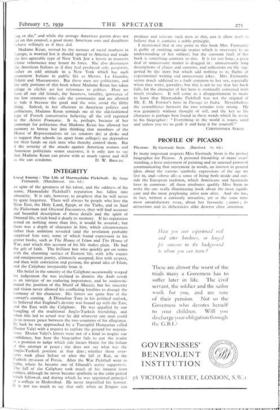INTEGRITY
IN spite of the greatness of his talent, and the oddness of his name, Marmaduke Pickthall's reputation has fallen into obscurity. It is safe, however, to prophesy that he will never he quite forgotten. There will always be people who love the Near East, the Holy Land, Egypt, or the Turks, and in Said the Fisherman and Oriental Encounters, they will find• accurate and beautiful description of those details and the spirit of Oriental life, which bind it dearly to memory. If his reputation rested on nothing more than this, it would be assured ; but there was a depth of character in him, which circumstances rather than ambition revealed (and the revelation probably surprised him too), some of which found expression in his graver books, such as The House of Islam and The House of War, and which this account of his life makes plain. He had the gift of faith. The brilliant boy who quickly got on terms with the charming surface of Eastern life, with jolly rogues and omnipresent poetry, ultimately accepted, first with respect, and then with conviction and passion, the grand idea of Islam, and the Caliphate inseparable from it.
His belief in the sanctity of the Caliphate occasionally warped his judgement (he was inclined to dismiss the Arab revolt as an intrigue of no enduring importance, and he underesti- mated the position of the Sherif of Mecca), but his sincerity and vision never allowed his conflicting loyalties to disrupt the harmony of his character. His letters are quite free of the convert's canting. A Disraelian Tory in his political outlook, he believed that England's destiny was bound up with the East, and the East with the Caliphate. He was appalled by our bungling of the traditional Anglo-Turkish friendship, and when this led to actual war he did whatever one man could do to restore peace between the two countries of his allegiance. By luck he was approached by a Turcophil Hungarian called Doctor Valyi with a request to explore the ground for negotia- tions. Doctor Valyi's letters were not of a kind to inspire our confidence, but here the biographer fails to put the reader a a position to judge which side incurs blame for the failure f this attempt at peace ; she does not say what was the ‘nglo-Turkish position at that date ; whether these over- tures took place before or after the fall of Kut, or the rurkish invasion of Persia. After the War Pickthall went to India, where he became one of Ghandi's active supporters. the fall of the Caliphate took much of his interest from politics, although he never became apathetic in the calm period which followed, and during which he was appointed principal of a college in Hyderabad. He never imperilled his honour. It is not too much to say that only when an Empire can
produce and tolerate such men as this, can it allow itself to believe that it contains a noble principle.
I mentioned that at one point in this book Mrs. Fremantle is guilty of omitting outside matter which is necessary to an understanding of her subject; but the constant fault of her book is something contrary to this. It is far too long; a great deal of unnecessary matter is dragged in : unnecessarily long descriptions of places and customs, and reflections on life sug- gested by the story but which add nothing to it; flights of experimental writing and unnecessary jokes. Mrs. Fremantle seems much addicted to a fault common to her sex, especially when they write, garrulity; but this is not to say that her book fails, for the character of her hero is eventually conveyed with much vividness. It will come as a disappointment to many to learn that Marmaduke Pickthall was not the original of Mr. E. M. Forster's hero in Passage to India. Nevertheless, the resemblance between the two remains very strong. He was genuinely without thought of self, and the key to his character is perhaps best found in these words which he wrote to his biographer : " Everything in the world is yours, until and unless you try to grab it and keep it for yourself."
CHRISTOPHER SYKES.










































 Previous page
Previous page